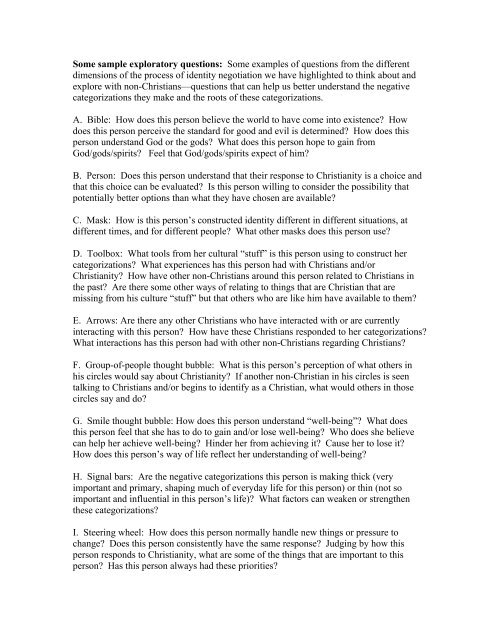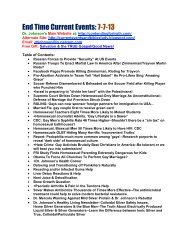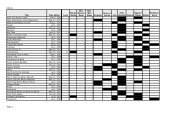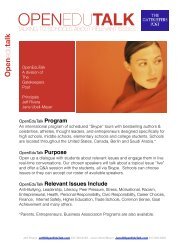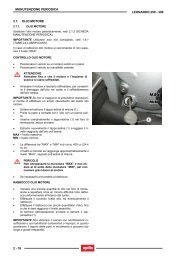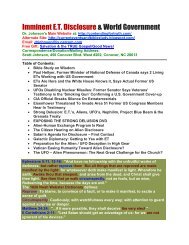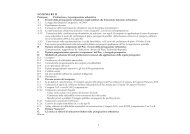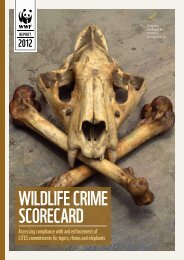Some sample exploratory questions: Some examples of ... - DivShare
Some sample exploratory questions: Some examples of ... - DivShare
Some sample exploratory questions: Some examples of ... - DivShare
You also want an ePaper? Increase the reach of your titles
YUMPU automatically turns print PDFs into web optimized ePapers that Google loves.
<strong>Some</strong> <strong>sample</strong> <strong>exploratory</strong> <strong>questions</strong>: <strong>Some</strong> <strong>examples</strong> <strong>of</strong> <strong>questions</strong> from the differentdimensions <strong>of</strong> the process <strong>of</strong> identity negotiation we have highlighted to think about andexplore with non-Christians—<strong>questions</strong> that can help us better understand the negativecategorizations they make and the roots <strong>of</strong> these categorizations.A. Bible: How does this person believe the world to have come into existence? Howdoes this person perceive the standard for good and evil is determined? How does thisperson understand God or the gods? What does this person hope to gain fromGod/gods/spirits? Feel that God/gods/spirits expect <strong>of</strong> him?B. Person: Does this person understand that their response to Christianity is a choice andthat this choice can be evaluated? Is this person willing to consider the possibility thatpotentially better options than what they have chosen are available?C. Mask: How is this person’s constructed identity different in different situations, atdifferent times, and for different people? What other masks does this person use?D. Toolbox: What tools from her cultural “stuff” is this person using to construct hercategorizations? What experiences has this person had with Christians and/orChristianity? How have other non-Christians around this person related to Christians inthe past? Are there some other ways <strong>of</strong> relating to things that are Christian that aremissing from his culture “stuff” but that others who are like him have available to them?E. Arrows: Are there any other Christians who have interacted with or are currentlyinteracting with this person? How have these Christians responded to her categorizations?What interactions has this person had with other non-Christians regarding Christians?F. Group-<strong>of</strong>-people thought bubble: What is this person’s perception <strong>of</strong> what others inhis circles would say about Christianity? If another non-Christian in his circles is seentalking to Christians and/or begins to identify as a Christian, what would others in thosecircles say and do?G. Smile thought bubble: How does this person understand “well-being”? What doesthis person feel that she has to do to gain and/or lose well-being? Who does she believecan help her achieve well-being? Hinder her from achieving it? Cause her to lose it?How does this person’s way <strong>of</strong> life reflect her understanding <strong>of</strong> well-being?H. Signal bars: Are the negative categorizations this person is making thick (veryimportant and primary, shaping much <strong>of</strong> everyday life for this person) or thin (not soimportant and influential in this person’s life)? What factors can weaken or strengthenthese categorizations?I. Steering wheel: How does this person normally handle new things or pressure tochange? Does this person consistently have the same response? Judging by how thisperson responds to Christianity, what are some <strong>of</strong> the things that are important to thisperson? Has this person always had these priorities?
J. Dollar sign: What does this person possess (e.g., resources, status, power, etc.) thatcauses others to defer to him? What does he lack that makes him need to defer to others?As this person makes choices, how much does he need to think about what others will say?What does this person lack that he is looking to gain? Where is this person located in thepower structure <strong>of</strong> the various groups <strong>of</strong> which he is a member and <strong>of</strong> society in general?K. Birdcage: In this person’s life, who are some <strong>of</strong> the people who have influenced themthe most? What would this person say are the most significant discoveries they havemade about life? Who would they say is “wise about life” and why would they choose tosingle out this person? What kinds <strong>of</strong> things make it more likely or less likely that theywill change?L. Conversation bubbles: What are key symbols (e.g., words, labels, etc.) that this personis using? From her perspective, what meanings are attached to these symbols?M. Birthday cake: What are some <strong>of</strong> this person’s early attachments? To what extentdoes this person feel that she needs to be loyal to and not make changes to the way thingswere early on? Has she always felt this way? Which persons have had the most influenceon this person from infancy through the time she went to school? What were these earlyinfluencers like, especially in their relationship to Christians and Christianity?N. Toilet paper: How is what this person is saying related to habit? Traditions? Has healways had these habits/traditions? Have they every changed? When did he first followthese habits/traditions? How does he feel about them? In this person’s mind, what dothese habits/traditions achieve? How would this person feel if he were forbidden fromdoing these things? What other habits/traditions has this person had (and given up) atother times in his life? Why the changes?O. Heart: How does what this person is saying relate to her need for belonging,continuity, and certainty? In what situations does this person feel a sense <strong>of</strong>belonging/continuity/certainty? Is there anything about Christians or Christianity thatthreatens her sense <strong>of</strong> belonging/continuity/certainty?P. Cutout people: What stereotypes does this person have <strong>of</strong> Christians and/orChristianity? When this person constructs her response to Christianity, does she have inmind a particular person or persons as exemplars <strong>of</strong> Christianity? Who are theseexemplars? What are these exemplars like?Q. Box: Are the negative categorizations that this person is making “easy to think” insome way? Why or why not?R. Small darkened person: How is the influence <strong>of</strong> the sinful nature evident in thesenegative categorizations <strong>of</strong> Christianity?
S. Triangle: What vestiges <strong>of</strong> the image <strong>of</strong> God do you see in this person as you interactwith them? What evidence do you see that he is longing for an intimate relationship withGod?T. Different colored stars: What differences between her own ways and Christian waysis this person noticing? Which differences is she overlooking or downplaying?


